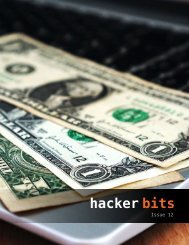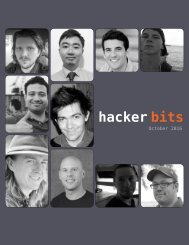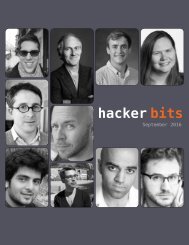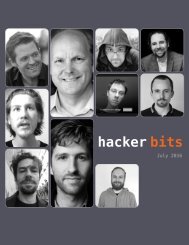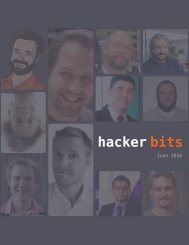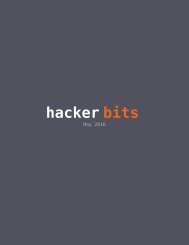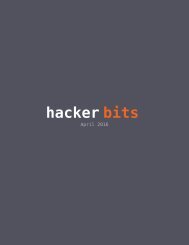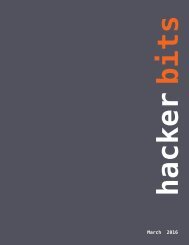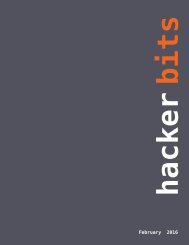Hacker Bits, August 2016
HACKER BITS is the monthly magazine that gives you the hottest technology stories crowdsourced by the readers of Hacker News. We select from the top voted stories and publish them in an easy-to-read magazine format. Get HACKER BITS delivered to your inbox every month! For more, visit https://hackerbits.com/2016-08.
HACKER BITS is the monthly magazine that gives you the hottest technology stories crowdsourced by the readers of Hacker News. We select from the top voted stories and publish them in an easy-to-read magazine format.
Get HACKER BITS delivered to your inbox every month! For more, visit https://hackerbits.com/2016-08.
You also want an ePaper? Increase the reach of your titles
YUMPU automatically turns print PDFs into web optimized ePapers that Google loves.
Utilitarianism — “Holding that the<br />
best moral action is the one that<br />
maximizes utility.”<br />
positive impact, based on<br />
their values.”<br />
• (3) Utilitarianism — “Holding<br />
that the best moral action<br />
is the one that maximizes<br />
utility.”<br />
• (3) Agnosticism — “The view<br />
that the truth values of<br />
certain claims — especially<br />
metaphysical and religious<br />
claims such as whether God,<br />
the divine, or the supernatural<br />
exist — are unknown and<br />
perhaps unknowable.”<br />
• (3) Veil of ignorance — “A<br />
method of determining the<br />
morality of a certain issue<br />
(e.g., slavery) based upon<br />
the following thought experiment:<br />
parties to the original<br />
position know nothing<br />
about the particular abilities,<br />
tastes, and positions individuals<br />
will have within a social<br />
order. When such parties<br />
are selecting the principles<br />
for distribution of rights,<br />
positions, and resources in<br />
the society in which they will<br />
live, the veil of ignorance<br />
prevents them from knowing<br />
who will receive a given<br />
distribution of rights, positions,<br />
and resources in that<br />
society.”<br />
Internet<br />
• (2) Filter bubble — “In which a<br />
website algorithm selectively<br />
guesses what information a<br />
user would like to see based<br />
on information about the<br />
user (such as location, past<br />
click behavior and search<br />
history) and, as a result, users<br />
become separated from<br />
information that disagrees<br />
with their viewpoints, effectively<br />
isolating them in their<br />
own cultural or ideological<br />
bubbles.” (Related: echo<br />
chamber)<br />
• (2) Botnet — “A number of Internet-connected<br />
computers<br />
communicating with other<br />
similar machines in which<br />
components located on networked<br />
computers communicate<br />
and coordinate their<br />
actions by command and<br />
control (C&C) or by passing<br />
messages to one another.”<br />
(Related: flash mob)<br />
• (2) Spamming — “The use of<br />
electronic messaging systems<br />
to send unsolicited<br />
messages (spam), especially<br />
advertising, as well as sending<br />
messages repeatedly<br />
on the same site.” (Related:<br />
phishing — “the attempt<br />
to acquire sensitive information<br />
such as usernames,<br />
passwords, and credit card<br />
details (and sometimes,<br />
indirectly, money), often<br />
for malicious reasons, by<br />
masquerading as a trustworthy<br />
entity in an electronic<br />
communication.”, clickjacking,<br />
social engineering)<br />
• (3) Content farm — “large<br />
amounts of textual content<br />
which is specifically designed<br />
to satisfy algorithms<br />
for maximal retrieval by<br />
automated search engines.”<br />
(Related: click farm — “where<br />
a large group of low-paid<br />
workers are hired to click on<br />
paid advertising links for the<br />
click fraudster.”)<br />
• (3) Micropayment — “A financial<br />
transaction involving a<br />
very small sum of money<br />
and usually one that occurs<br />
online.”<br />
• (3) Godwin’s law — “If an<br />
online discussion (regardless<br />
of topic or scope) goes on<br />
long enough, sooner or later<br />
someone will compare someone<br />
or something to Hitler or<br />
Nazism.” •<br />
Reprinted with permission of the original author. First appeared as a working document at medium.com/@yegg.<br />
hacker bits<br />
43





